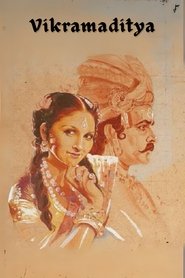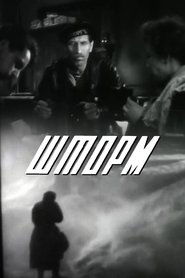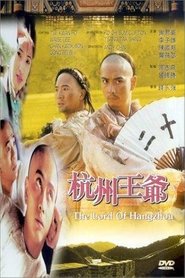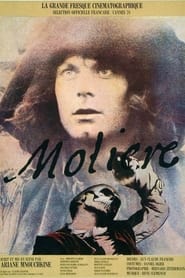Popular History Movies on Pantaflix - Page 172
-
To My Wife
2012
To My Wife
2012
A young actress got into a car accident and crossed over to an era 100 years from now and met her lover then. The title was based from a famous letter written by Lin Juemin, an early Qing Dynasty revolutionary, to his wife before his death. -
Vikramaditya
1945
Vikramaditya
1945
A legendary king of Avanti, Vikramaditya, pledges to protect Princess Shreelakha of Kashmir from the Shakas, appointing Kalidas as his court poet. The film depicts Vikramaditya's heroic battles, his eventual defeat of Shakaraj, and the restoration of Kashmir's kingdom. -
Storm
1957
Storm
1957
In the winter of 1918, a provincial Russian town is faced with a shortage of food, firewood, and medicine. Discontent is brewing in the Red Army regiment stationed in the town, as former Tsarist officers sow seeds of discord in an attempt to organize a counter-revolutionary rebellion. -
Mayflower: The Pilgrims' Adventure
1979
star 6.5In 1620, the Assembly of the Pilgrims decides to emigrate to the young America because of the persecution they suffer by the English crown. The film tells the adventurous journey of the Pilgrims to an unknown land and future. -
Uncensored Women
2022
Uncensored Women
2022
The story of a group of actresses who, in the Spain of the seventies, and in the midst of the democratic Transition, decided to appear nude in the films of that time of radical political change, defying the rigid and deeply rooted social rules. -
The Lord of Hangzhou
1998
The Lord of Hangzhou
1998
star 5Based on a popular folklore from ancient China, THE LORD OF HANGZHOU is the chronicle of Emperor Qianlong's many secret tours to Southern China, and the friendship he developed with Miqi, a big spender from a wealthy family. Their relationship laid the background for what was to follow, as Miqi subsequently headed to the Capital City after losing all his fortunes... -
Veritas vincit
1919
Veritas vincit
1919
"Truth Wins" - A history film that is particularly elaborate in terms of its features and that attempts to illustrate the perpetual victory of the truth about the lie in three epic episodes. -
The Timok Rebellion
1983
The Timok Rebellion
1983
star 5.7In 1883 Milan Obrenovic, arrogant and despotic king of Serbia, felt threatened by the militia segments of his army. In order to remove that threat he disbanded militia. However, people of Timok Valley decide not to surrender their arms to the regular troops. The movie was made for the 100th anniversary of the event. -
J. Edgar Hoover
1987
J. Edgar Hoover
1987
He battled the Kennedys and Martin Luther King, encouraged McCarthy and single-handedly changed the course of history. Hired by F.D.R. to be the director of the FBI, Hoover erected the most sophisticated investigatory agency in the world. -
The Belief
0000
The Belief
0000
In the twenty-second year of the Kangxi Emperor's reign (1683 A.D.), in an attempt to stop Zheng's blatant attempts at independence in Taiwan, the Kangxi Emperor sent Shi Lang, the governor of the Fujian Naval Division, to lead an army to collect Taiwan. An advance team from the imperial court paid a terrible price to lure Zheng's navy into a trap. Shi Lang led a large naval force to attack Penghu in a surprise attack, wiping out the main force of Zheng's army and eventually unifying Taiwan. -
Kochubey
1958
-
Outlaw King
2018
Outlaw King
2018
star 6.8Forced into exile by the English after being crowned King of Scotland, legendary warrior Robert the Bruce fights to reclaim the throne. -
Pharaoh
1966
Pharaoh
1966
star 6.7Young Pharaoh Ramses XIII clashes with Egypt's clergy over influence on the affairs of the state and its coffers. inexperienced, but quite ambitious pharaoh is putting up a fight against a powerful clan of priests usurping rule over the country. -
Caravaggio's Shadow
2022
Caravaggio's Shadow
2022
star 6.4The Catholic Church secretly investigates Caravaggio as the Pope weighs whether to grant him clemency for killing a rival. -
Keep Your Eyes Open!
1982
-
The Daughter of the Pope: Lucrezia Borgia
2024
star 4The incredible story of Lucrezia Borgia (1480-1519), daughter of Pope Alexander VI (1431-1503), deliberately used politically by her powerful family and historically slandered as a poisoner and incestuous femme fatale. But who was the real Lucrezia? -
Naked Among Wolves
2015
Naked Among Wolves
2015
star 7.3Taking place at the Concentration camp Buchenwald at the end of March 1945, prisoner Hans Pippig discovers in a carrying case of an incoming prisoner a Jewish child. If reported the three-year-old is sure to die. On the other hand, a violation of the rules of the camp would threaten the long prepared uprising of the concentration camp prisoners against the SS. -
Královský gambit
1974
Královský gambit
1974
Wenceslas II, who already has adult children Eliška and Václav, refuses to marry the young Alžběta Rejčka. In the end, he succumbs to the insistence of Abbot Konrád. The queen brings him Poland as a dowry, and Wenceslas II thus expands his empire. He still lives in the shadow of his great father, Přemysl Otakar II, and his lords reproach him for his weakness and inability to fight. Wenceslas is truly afraid of the moment when he will have to lead an army into the field and prefers to settle disputes diplomatically. His fencing teacher Hynek of Dubá and his mistress Anežka know about the king's weakness, and Václav seeks their company rather than his young wife. However, Rejčka admires the king and trusts him with the charm of a young girl. The enemy invades the country and advances quickly. It is necessary to confront him in the field, but the king hesitates and postpones the decision. -
Molière
1978
Molière
1978
star 5.9Jean-Baptiste Poquelin is raised by his father and his grandfather because his mother dies when he's still very little. He works as a handyman, studies the law at a university and travels the country as an actor before he becomes the celebrated playwright Molière who impresses firstly the Duke of Orleans and then even King Louis XIV.
 Netflix
Netflix
 Amazon Prime Video
Amazon Prime Video
 Apple iTunes
Apple iTunes
 Apple TV Plus
Apple TV Plus
 Disney Plus
Disney Plus
 Google Play Movies
Google Play Movies
 Paramount Plus
Paramount Plus
 Hulu
Hulu
 HBO Max
HBO Max
 YouTube
YouTube
 fuboTV
fuboTV
 Peacock
Peacock
 Peacock Premium
Peacock Premium
 Amazon Video
Amazon Video
 The Roku Channel
The Roku Channel
 AMC+
AMC+
 Kocowa
Kocowa
 Hoopla
Hoopla
 The CW
The CW
 Vudu
Vudu
 Starz
Starz
 Showtime
Showtime
 PBS
PBS
 Pantaflix
Pantaflix
 FXNow
FXNow
 Tubi TV
Tubi TV
 Kanopy
Kanopy
 Comedy Central
Comedy Central
 Crunchyroll
Crunchyroll
 Microsoft Store
Microsoft Store
 Redbox
Redbox
 Sun Nxt
Sun Nxt
 ABC
ABC
 DIRECTV
DIRECTV
 Crackle
Crackle
 Fandor
Fandor
 Plex
Plex

















